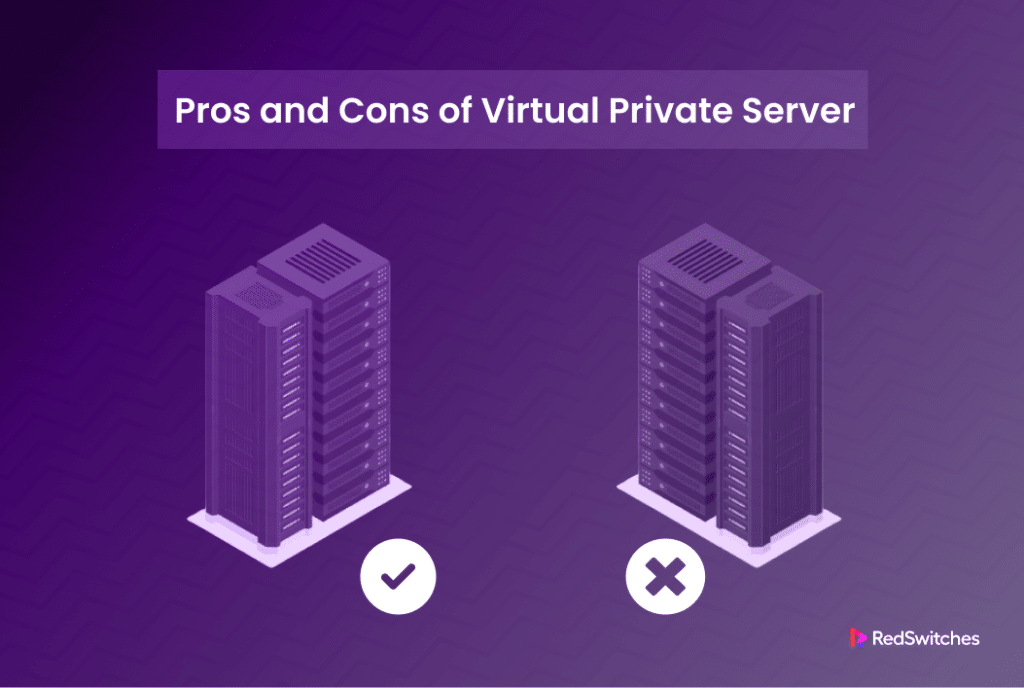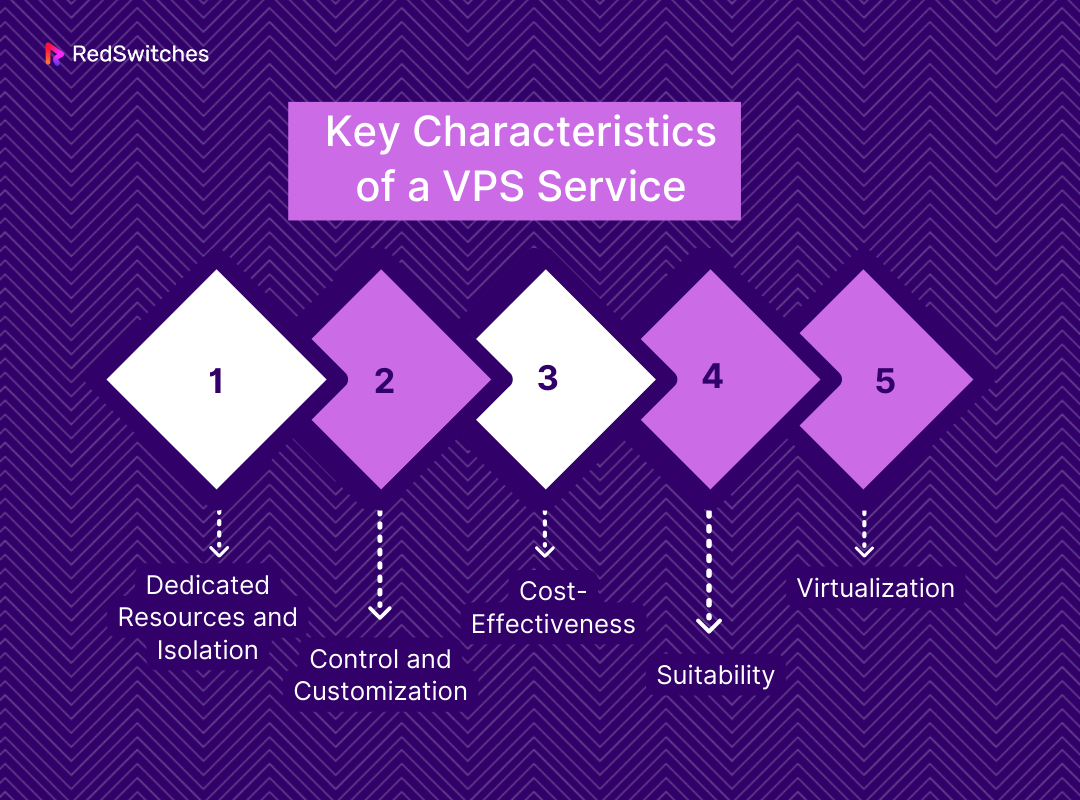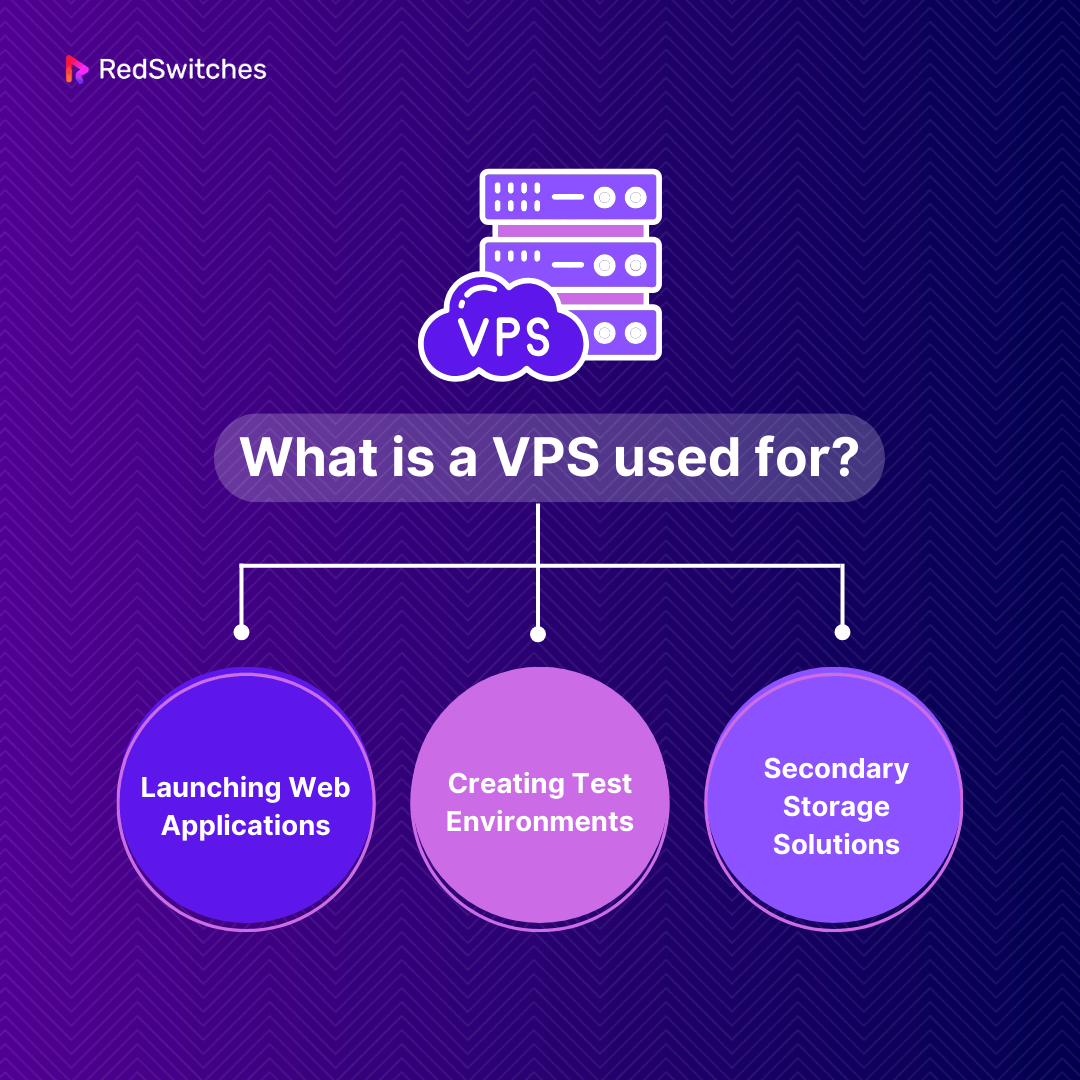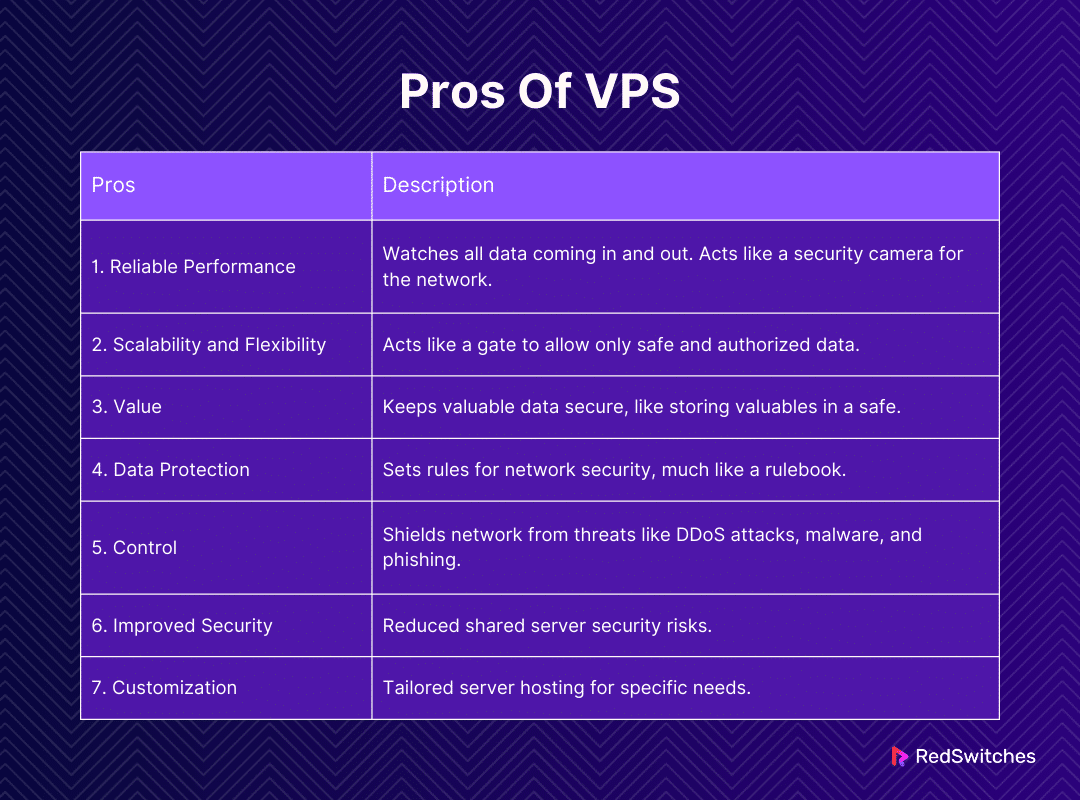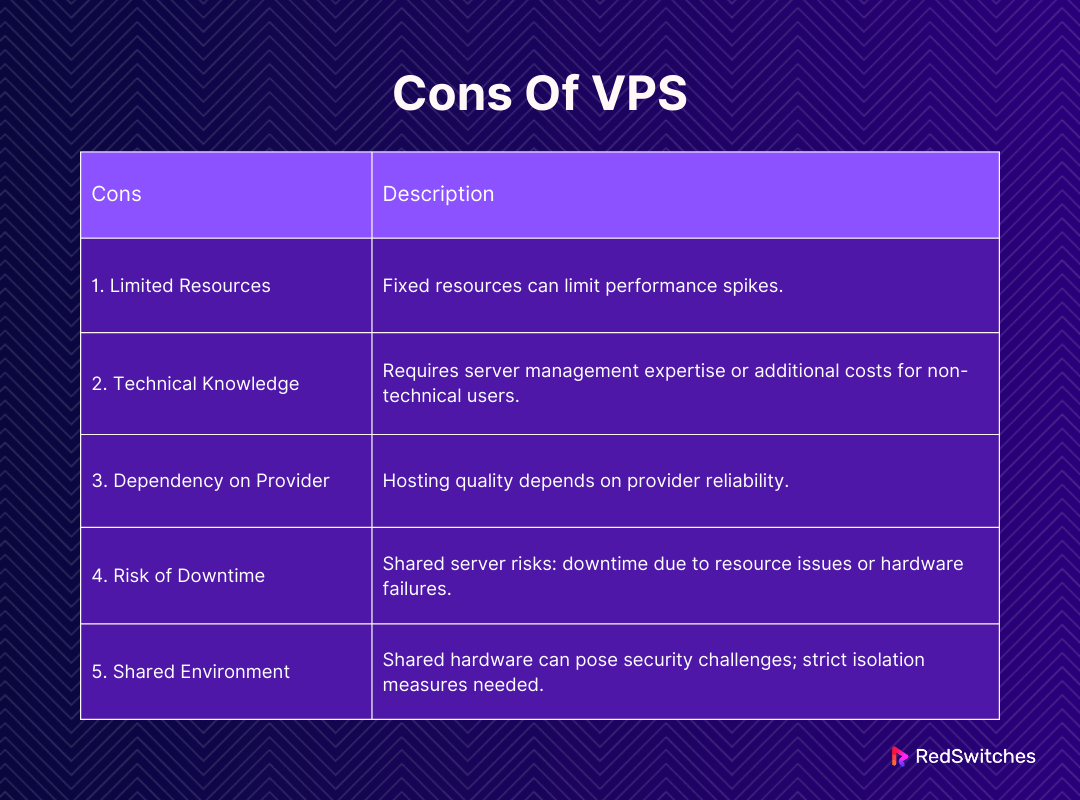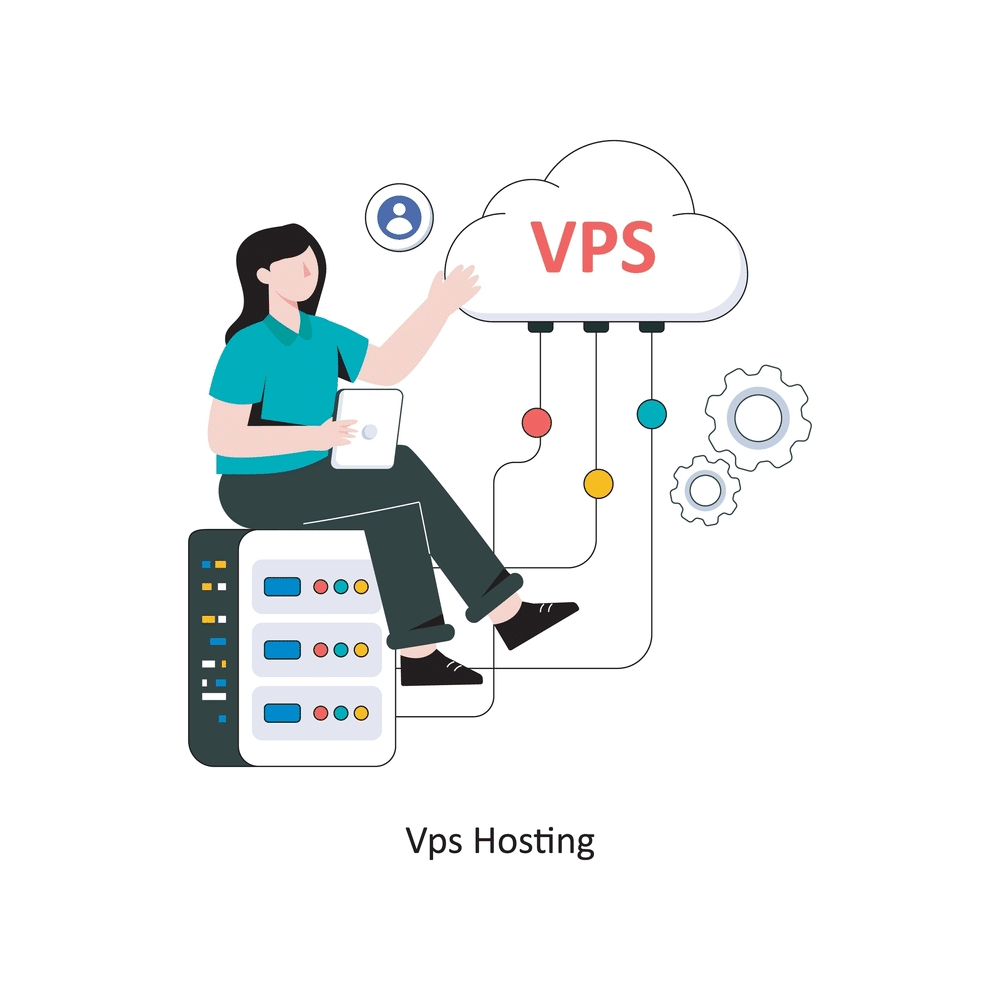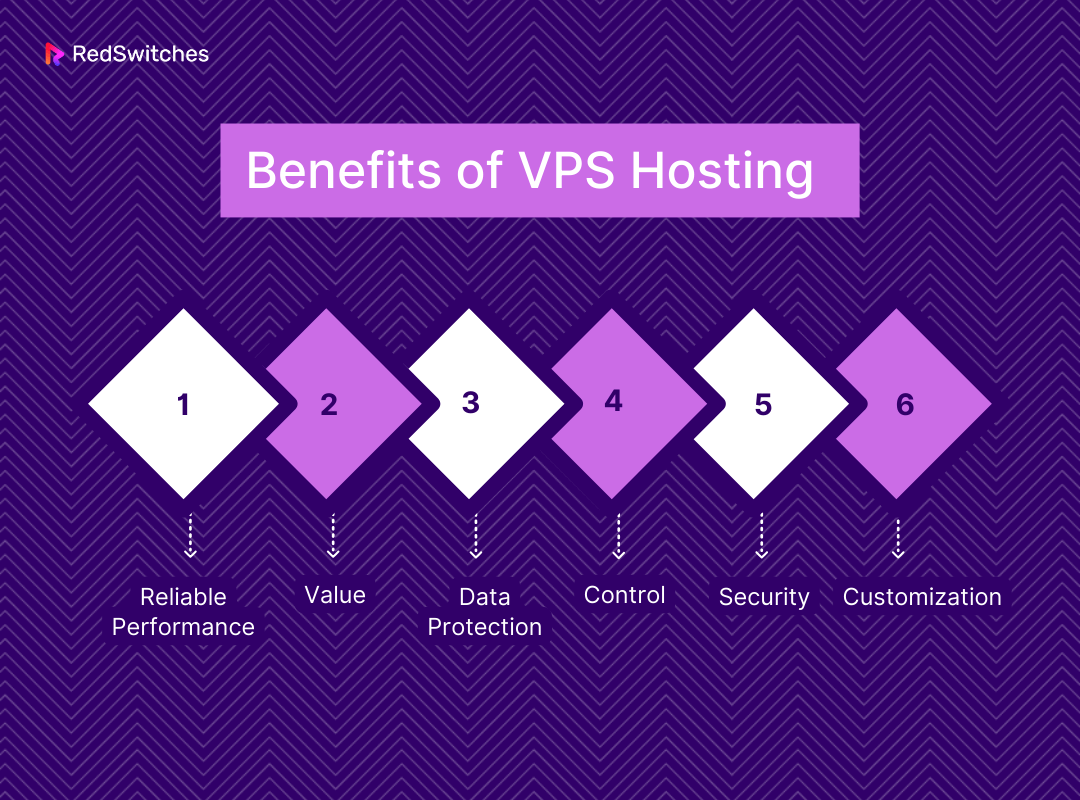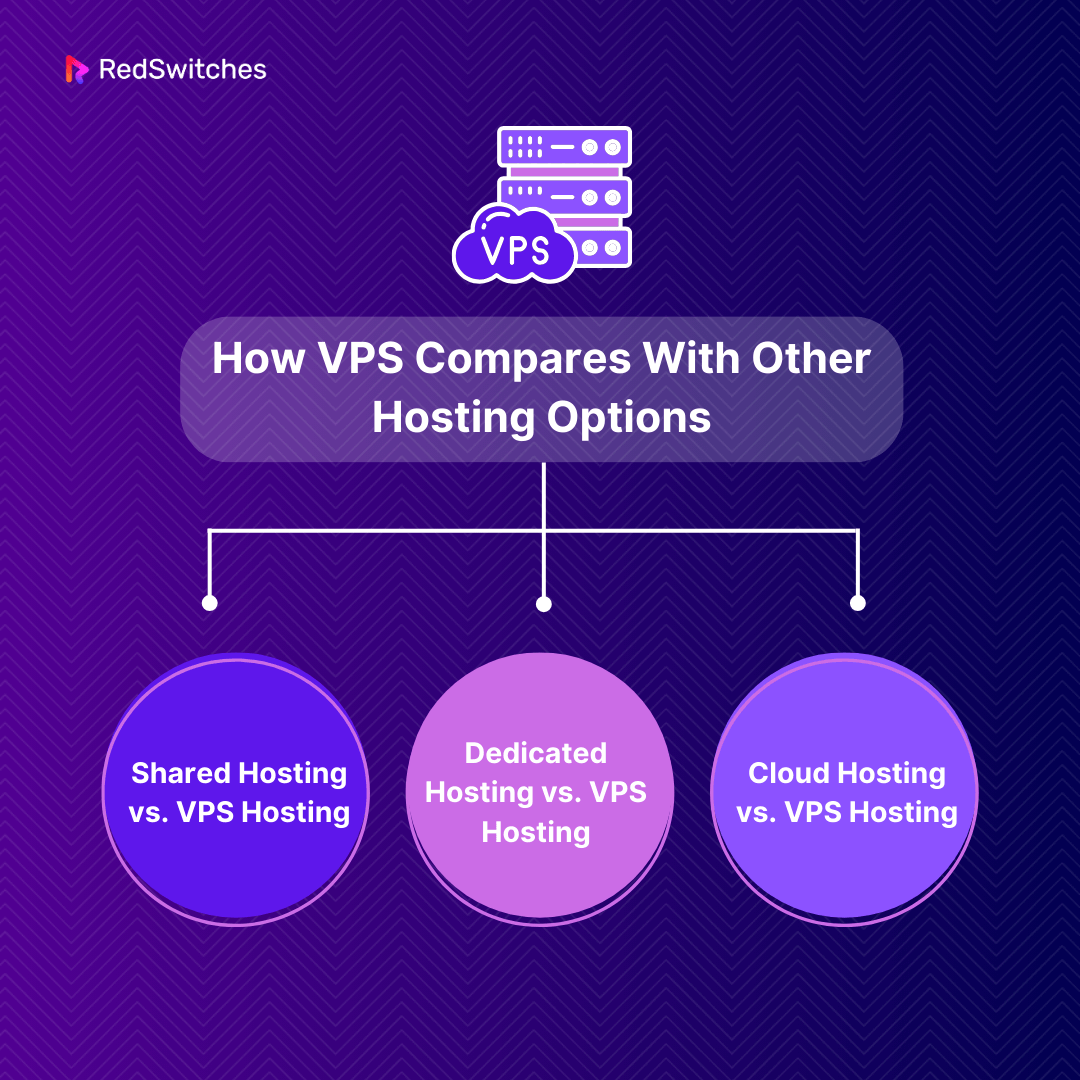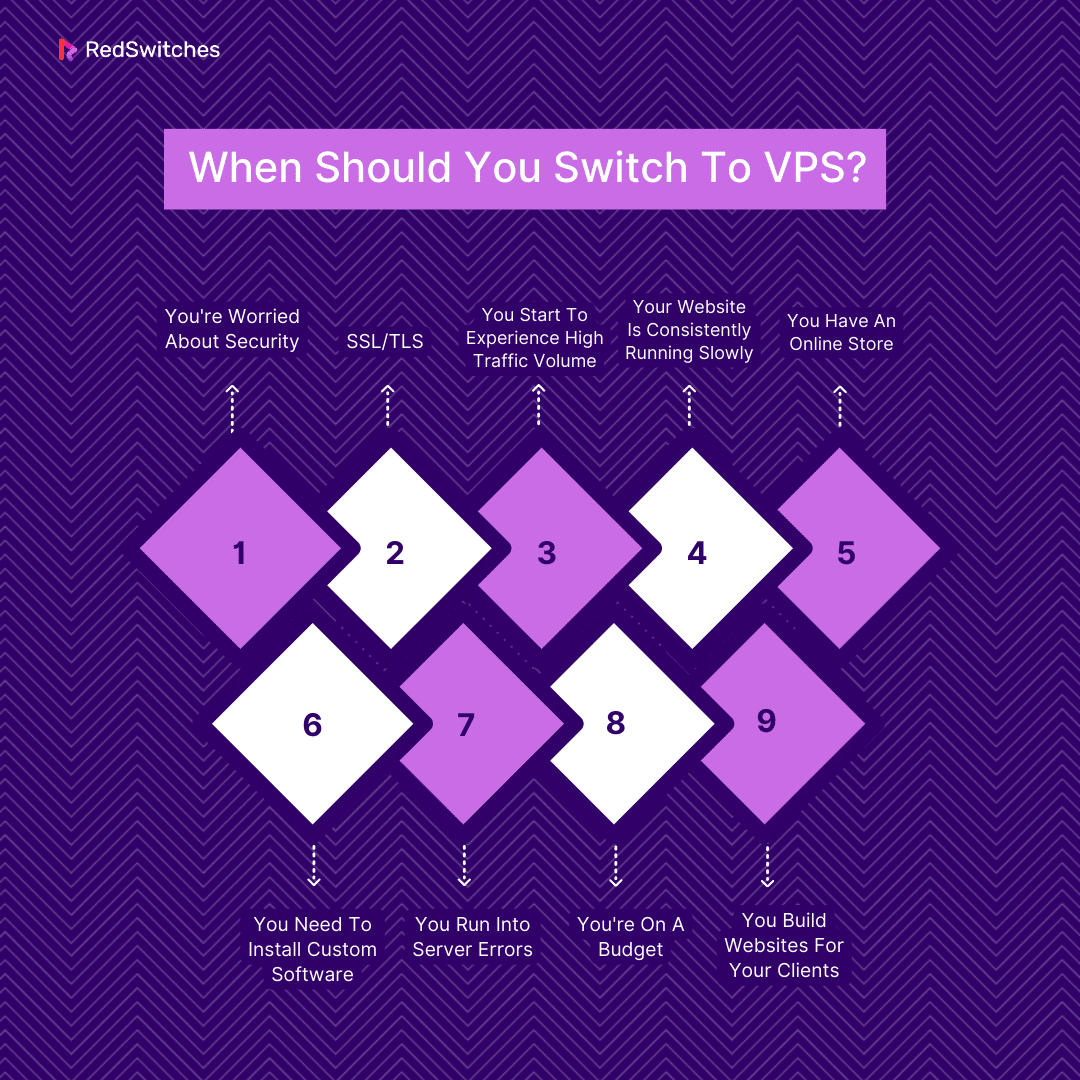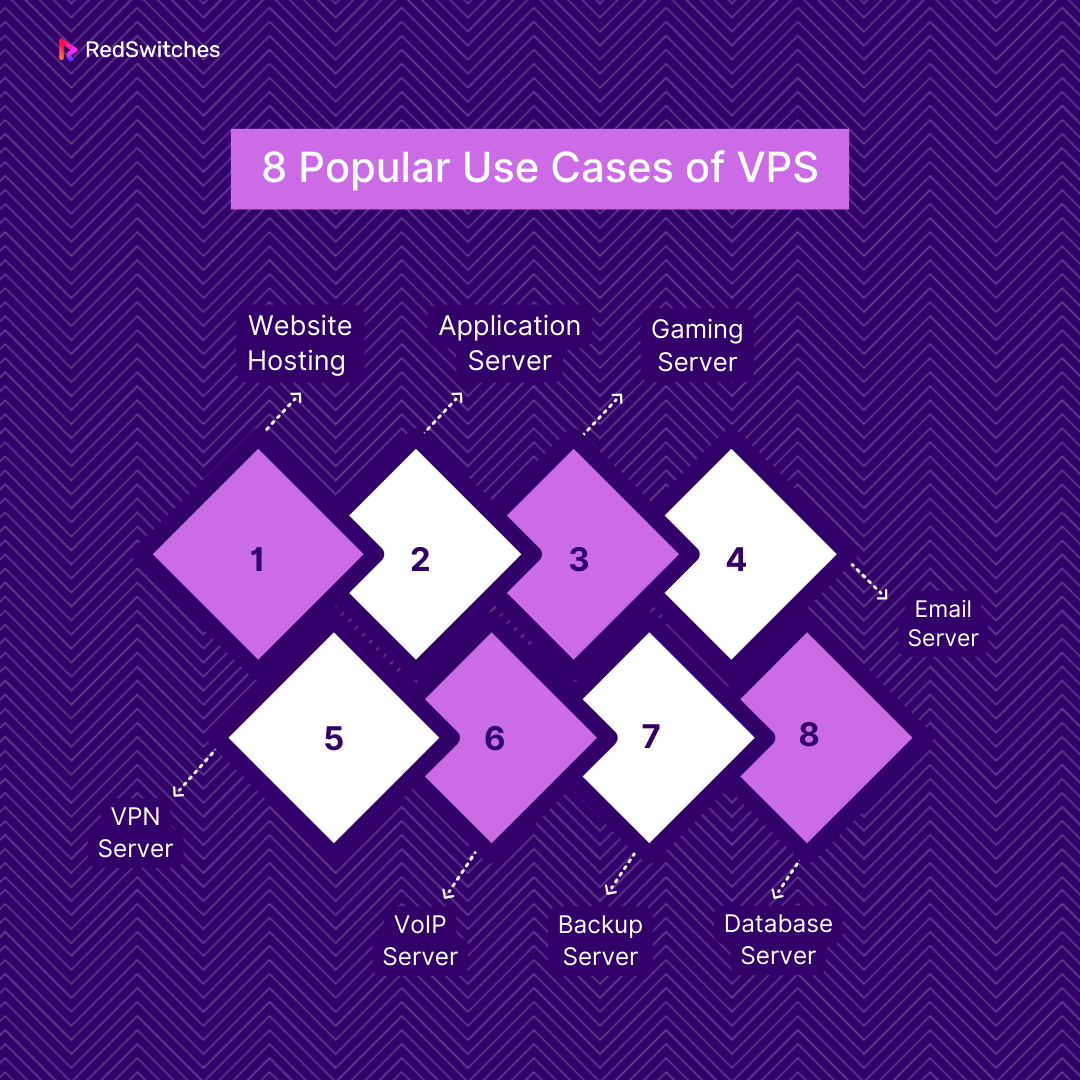Key Takeaways
- VPS offers a middle ground between shared and dedicated hosting, providing control, flexibility, and dedicated resources at a cost-effective price.
- With dedicated resources, VPS ensures stable performance, making it ideal for websites with moderate traffic that exceeds shared hosting capabilities.
- VPS hosting allows for easy scalability, enabling users to adjust resources as their needs grow, without significant downtime or service disruption.
- Managing a VPS can require a certain level of technical knowledge, especially for unmanaged services, which might necessitate additional support for those without IT skills.
- Despite sharing physical hardware, VPS offers an isolated environment for each user, enhancing security compared to shared hosting.
- While more generous than shared hosting, VPS resources are still finite and can be outstripped by high-demand applications or significant traffic spikes.
- The performance and reliability of a VPS can heavily depend on the hosting provider’s quality, emphasizing the importance of choosing a reputable service.
- Sharing physical hardware means that issues with the server or other VPS instances can potentially impact your VPS’s uptime and performance.
Virtual Private Servers (VPS) have become popular for web hosting because they provide more control, flexibility, and resources than shared hosting while being more cost-effective than dedicated servers. However, like any technology, VPS has its advantages and disadvantages.
Whether you’re a small business owner looking for a hosting solution that balances performance and budget or an individual with specific hosting requirements, this exploration of VPS pros and cons will equip you with the knowledge needed to make an informed decision for your online presence. Join us as we embark on a journey to uncover the intricacies of Virtual Private Servers and determine if they align with your unique hosting needs.
In this blog post, we’ll delve deeper into the world of Virtual Private Servers, shedding light on the remarkable benefits they offer to businesses and website owners. We’ll also discuss the potential challenges and limitations of VPS hosting to provide you with a comprehensive understanding of this hosting solution.
Table of Contents
- Key Takeaways
- What Is A Virtual Private Server (VPS)?
- Difference Between VPS Hosting and Virtual Private Server VPS
- Pros And Cons Of VPS
- What is VPS Hosting?
- How VPS Compares With Other Hosting Options
- When Should You Switch To VPS?
- 8 Popular Use Cases of VPS
- Conclusion
- FAQs
What Is A Virtual Private Server (VPS)?
Credit: Shutterstock
A Virtual Private Server is a hosting solution that blends the features of shared and dedicated server hosting. It operates on a physical server. It is divided into virtual environments through virtualization technology. Each VPS acts as an isolated server, hosting all the necessary software and data to run applications or websites.
Despite being housed on shared physical hardware, a VPS provides dedicated resources. Those include RAM and CPU power, ensuring enhanced performance and security.
Key Characteristics of a VPS Service
A Virtual Private Server (VPS) is a popular hosting solution for medium to large-scale online projects, combining elements of shared hosting and servers to offer a balanced approach.
Here are the key characteristics of a VPS:
Dedicated Resources and Isolation
You receive a reserved amount of resources like RAM and CPU. This ensures that your server’s performance is not affected. Other users can do it on the same physical hardware. This isolation also contributes to a more secure and stable hosting environment.
Control and Customization
With root access, you can install applications and change your environment. Thus, offering a level of control like dedicated servers.
Cost-Effectiveness
It is more affordable than dedicated hosting, making it ideal for businesses. Or individuals who need more than what shared hosting offers, but are not ready for a server’s expense.
Suitability
It’s an excellent choice for many users. This includes SaaS providers, game developers, and programmers. Companies outgrowing shared hosting will benefit. Those needing a secure backup environment also find it suitable.
Virtualization
The server is a powerful computer. It delivers your website or application to users. Virtualization technology enables this server to function as many independent servers. This offers the benefits of dedicated hosting without the high costs.
This guide provides a comprehensive understanding of VPS. It helps you determine if VPS is the right hosting solution for your needs.
Also read: Basic Knowledge to Get You Started with VPS Hosting.
How Does A VPS Work?
Credit: Shutterstock
A Virtual Private Server (VPS) uses virtualization technology. It creates a dedicated server environment within a shared server. Here’s the process:
Your hosting provider installs a hypervisor. This is a virtual layer. It is placed over the server operating system. This layer divides the server into many independent compartments or virtual machines. Each compartment can run its operating system and software, functioning.
In your private compartment, you can install your preferred operating systems. Such as Linux, essential software and tools like MySQL, or a control panel like cPanel. This customization mirrors the experience of using a server.
One of the key benefits of a VPS is the allocation of guaranteed resources. In shared hosting, resources are spread among all users on a server. A VPS, however, reserves a specific set of resources for your use only. These include memory, disk space, and CPU cores. This ensures stable performance for your server. The demand of other websites on the same server does not affect it.
A VPS offers an isolated, private environment for your website. It comes with dedicated resources. This type of hosting balances affordability, like shared hosting. It also provides control and performance, akin to a server.
What Is a VPS Used For?
VPS servers have a range of applications, as illustrated by these examples.
Launching Web Applications
VPS servers are ideal for launching and operating web applications. Take Gourmet, a gourmet meat store in the US, as an example. They utilized Amazon VPS services to deploy an inventory management system. Before, they relied on spreadsheets for inventory tracking. They switched to a cloud-based system. This system consolidates reports. It streamlines inventory management. It provides real-time data access to decision-makers.
Creating Test Environments
VPS servers offer a cost-effective solution for developing and testing new applications. For instance, Bugout. Dev, an American startup, used a VPS to create a search engine tailored for developers. They conduct trials to improve features and search functionality. The flexibility of VPS environments is notable. They are cost-effective. VPS hosting allows you to experiment without enduring high expenses, making it a cost-effective choice in the world of web servers. This is beneficial despite a high experiment rejection rate.
Secondary Storage Solutions
VPS can also serve as a secondary storage solution for various data files. It can act as a server for files, images, or emails. This provides secure, accessible, and centralized storage. It serves a group of users. This functionality enhances data management and sharing within an organization or team.
Difference Between VPS Hosting and Virtual Private Server VPS
The terms “VPS Hosting” and “VPS Server” are often used interchangeably. But they can imply slightly different things in the context of web services and hosting.
VPS Hosting is like a full package. It’s not just about having a virtual server. It also includes extra help and services from the hosting company. This means things like help when you have a problem, tools to manage your server, and options to make your server bigger or smaller depending on your needs. It’s more about the whole experience.
VPS Server is more specific. It’s just about the virtual server itself. Think of it as focusing on what the server can do – how fast it is, how much memory it has, and what kind of software it can run. It’s mainly about the technical details of the server.
In short, “VPS Hosting” is about the overall service, including the server and the support you get. “VPS Server” is more about the specific details and capabilities of the server itself.
Pros And Cons Of VPS
Credit: Freepik
Virtual Private Server (VPS) is a popular choice among businesses and individuals who seek a balance between the affordability of shared servers and the power of dedicated servers. Understanding the pros and cons of VPS can help you decide if it’s the right solution for your web hosting provider.
Pros
The following are the pros of VPS:
Reliable Performance
One of the standout advantages of VPS hosting is its reliable performance. Unlike shared hosting, where resources are distributed among multiple users, a VPS provides dedicated resources to each user. This means you get a fixed share of CPU, RAM, and disk space, significantly reducing the risk of your website’s performance being affected by other websites on the same server. This reliability is crucial for businesses that experience high traffic volumes or run resource-intensive applications.
Scalability and Flexibility
It is highly scalable, allowing you to adjust your resources as your needs change easily. Whether your website’s traffic is growing or launching new applications on your web server, with VPS hosting, you can quickly scale up your CPU, RAM, and storage without experiencing downtime. This flexibility ensures that your hosting environment can grow with your business, making VPS a long-term solution for many.
Value
It offers an excellent balance between cost and performance. While it’s more expensive than shared hosting, it’s significantly more affordable than renting an entire server. VPS provides the necessary resources and capabilities for many small to medium-sized businesses and tech-savvy individuals without breaking the bank, offering a great value proposition.
Data protection
You have a distinct portion of the server entirely to yourself. This isolation from other users on the same physical server enhances data protection. You can implement your security measures, backups, and disaster recovery plans, giving you more control over protecting your data.
Control
A VPS gives you root access to your server environment, allowing you to install and configure software applications according to your needs. This level of control is particularly beneficial for developers and businesses with custom applications, as it provides the freedom to configure the server in a way that best supports your applications and workflows.
Improved Security
The isolated environment of a VPS also contributes to improved security. Since your virtual server is separated from other users, the actions of another user on the same server do not affect your VPS. This separation minimizes the risk of security breaches that are more common in shared hosting environments.
Customization
It offers extensive customization options. You can choose the operating system (OS) and software you want to run, tailor your hosting environment to your requirements, and adjust settings to optimize performance. This level of customization makes VPS hosting ideal for those with specific technical requirements or those looking to optimize their server for performance.
Cons
Virtual Private Servers (VPS) have become popular among businesses and individuals. This popularity stems from their ability to offer a middle ground between shared hosting and dedicated servers. However, like any technology, different types of web hosting, including VPS hosting, have advantages and disadvantages. In this section, we will delve into the cons of VPS hosting to help you make an informed decision.
Limited Resources
One of the primary drawbacks of VPS hosting is the limitation in resources. Although a VPS provides more resources than shared hosting, it still falls short compared to a server. Each VPS on a single server shares the server’s total resources. This means you have a fixed amount of CPU, RAM, and disk space. If your website experiences sudden spikes in traffic or requires high resource usage, you might find these limitations restrictive. This constraint can impede the performance of your website or application, especially if it’s resource-intensive.
Technical Knowledge Required
Managing a VPS requires a certain level of technical expertise. Unlike shared hosting, where most of the server management is handled by the hosting provider, VPS hosting often requires the user to understand server management and maintenance well. This includes software updates, security patches, and troubleshooting any issues.
For those without technical expertise, this could mean additional costs for hiring a system administrator or opting for a managed VPS service, which can be more expensive.
Dependency on Hosting Provider
Your experience with a VPS can significantly depend on the quality of the hosting provider. Factors such as the physical server’s performance, network connectivity, and overall reliability are out of your control and lie in the hands of the provider. A subpar hosting provider can lead to poor server performance, security vulnerabilities, and inadequate customer support. Therefore, choosing a reputable and reliable hosting provider is crucial but challenging.
Risk of Downtime
While VPS is generally more reliable than shared hosting, it still carries a risk of downtime. This risk stems from the fact that you are sharing the physical server with other VPSs. If another VPS on the same server experiences problems or overuses resources, it can affect your VPS’s performance and uptime. Moreover, any physical server issues, such as hardware failures, can lead to downtime, which can be detrimental to your website or business operations.
Shared Environment
Although a VPS provides a degree of isolation, it is still part of a shared environment. Your VPS shares the same physical hardware with other VPS instances, which can lead to security concerns. For instance, if another VPS on the same server is compromised, there’s a potential risk, albeit small, that it could affect other VPSs on the same server. This shared environment also means stringent security measures are required to ensure each VPS is adequately isolated and secure.
What is VPS Hosting?
Credit: Shutterstock
Virtual Private Server Hosting combines shared and dedicated hosting benefits. It offers a cost-efficient balance with resource allocation. In this model, your website operates on a powerful shared server. However, it has its virtual machine, ensuring dedicated resources. Your site gets its operating system, dedicated storage, a robust CPU, scalable RAM, and often unlimited bandwidth.
This setup offers dedicated hosting control at a lower cost. The shared physical infrastructure makes it more affordable. It’s perfect for users needing a website or web application setup. VPS providers handle the complexities of physical server management. Users can focus on deploying and configuring their applications or websites. A VPS provides secure, reliable, and consistent performance. It’s an excellent choice for hosting websites.
At its core, a VPS is a virtual OS residing within a parent server, created through virtualization. It provides private resources to other virtual servers. This virtual environment emulates a physical server with similar processes and functionality. But it is a piece of software imitating dedicated hardware.
How Does VPS Hosting Work?
Credit: Shutterstock
Running a VPS allows you to create your website in a secure space with guaranteed resources like memory, disk space, and CPU cores. You don’t have to share these resources with others. This hosting gives you the same high-level access as a dedicated server, but it’s much more affordable.
It is like having your piece of a computer used to store your website’s stuff. When someone wants to see your website, their computer talks to your piece of the computer through the internet.
Here’s how it works:
- Your web host keeps your website stuff on a computer called a server.
- When someone wants to visit your website, their computer asks the server for your stuff.
- VPS hosting gives you a special piece of the server that acts like your own little computer. But it’s not all yours – other people also use parts of the same computer.
Here’s how they make it work:
Your hosting company puts a special layer on the server’s main software. This layer divides the server into parts so each person can have their software and settings.
So, a VPS is like having your private room on the server. You can control it, and it’s separate from other people’s stuff. It’s like when you have different sections on your computer for different things, like using Windows and Linux without restarting.
Having a VPS with a managed hosting service means you get your own secure space with specific resources, like memory and space. You don’t have to share with others. It’s almost like having your fancy server, but it costs less.
Benefits of VPS Hosting
VPS hosting offers an impressive blend of performance, value, security, and customization. It’s an ideal solution for businesses looking to upgrade from shared hosting, and those needing a more scalable, secure, and controllable hosting environment than what shared hosting can provide.
Let’s dive into its benefits:
Reliable Performance
Choosing a VPS hosting plan is a strategic decision. It is ideal for websites that have outgrown shared hosting. One major benefit of VPS hosting is reliable performance. With dedicated hardware resources, you get consistent speed and uptime. This is vital for performance during high traffic. Such reliability offers a smooth experience for website visitors. It also positively impacts search engine rankings. This can attract more traffic and clients.
Value
While VPS hosting is a step up in cost compared to shared hosting, it offers significant value. It bridges the gap between the affordability of shared hosting and the resources of dedicated hosting. You pay only for what you need, making it a cost-effective solution for businesses seeking a balance between performance and budget. The scalability of VPS hosting allows for easy and quick adjustments to your resource allocation, ensuring that your hosting can grow with your business needs.
Data Protection
Data protection is paramount in today’s digital landscape. VPS hosting excels in this area by offering robust options for server backups. In a managed hosting service, daily backups are standard, ensuring that your data on the VPS is regularly saved and can be quickly restored in case of any data loss incidents. This level of data protection is a significant step up from shared hosting environments.
Control
With VPS hosting, you gain more control over your server environment. This includes SSH and root access, allowing for deeper customization and management of your server. Such control is essential for businesses requiring specific configurations or implementing particular security measures, which is why many choose VPS as their web hosting service.
Security
In a VPS environment, the isolation from other servers enhances security. Unlike shared hosting, where a vulnerability in one website could impact others on the same server, VPS hosting keeps your environment separate and safeguarded. This isolation minimizes risks and offers a more secure hosting solution.
Customization
Customization is another standout feature of VPS hosting. It accommodates a wide range of needs. You can choose specific features, including your preferred operating system. This level of customization ensures perfect alignment. Your hosting environment matches your business requirements and technical specifications.
Additional Support and Optimization
Beyond these core benefits, VPS hosting also provides access to a team of professionals. They are dedicated to server management. This support includes:
- Implementing updated best practices and new technologies in VPS hosting.
- Offering round-the-clock support to minimize downtime.
- Optimizing your environment for peak performance and security.
- Allowing your IT team to focus on your web application, free from concerns about VPS hosting complexities.
- Quick troubleshooting and resolution of common issues by the VPS hosting provider.
You can also check out the benefits of server hosting for startups and SMBs: 6 Incredible Benefits of VPS Hosting For Startups.
How VPS Compares With Other Hosting Options
Various web hosting options offer varying degrees of server customization, each with its unique performance factors such as page loading speed and service availability like uptime. Let’s explore the differences between VPS hosting and other hosting alternatives.
VPS Hosting
Credit: Freepik
VPS hosting is a middle ground. It employs virtualization technology to provide a private server on a shared physical server. Unlike shared hosting, VPS allocates specific resources like CPU cores, memory, and storage, ensuring stable performance.
Now that we’ve grasped VPS hosting well, let’s dive into how it compares to other hosting options. Understanding these differences can help you decide on the best hosting solution for your website needs.
Now, let’s compare vps hosting to other options.
Shared Hosting vs. VPS Hosting
Credit: Freepik
Shared hosting resembles an apartment complex. Where many residents share the same resources like water, electricity, and space. Similarly, in shared hosting, multiple websites share the same server resources. Websites reside on a single server, sharing CPU, RAM, and storage resources. It’s budget-friendly and ideal for smaller sites or blogs with less traffic.
However, the shared setup can lead to performance issues if other sites on the same server are resource-heavy. It’s like living in a shared apartment; you have your space, but common areas are communal.
On the other hand, VPS hosting is akin to having your own townhouse. You still share a physical server with others, but you get dedicated resources like your own room, bathroom, and kitchen. This means better performance, security, and flexibility. VPS hosting is a great choice for websites that need more control and resources.
Read more about it in detail: VPS vs Shared Hosting
Dedicated Hosting vs. VPS Hosting
Credit: Shutterstock
Dedicated hosting is like owning a private house. It involves leasing an entire server solely for your website. This offers full control over hardware, software, and the operating system. Best for high-traffic sites needing strong performance and specific setups. Though offering maximum customization and control, it’s costlier and requires more technical know-how. It is generally suitable for large websites or businesses with substantial traffic.
In contrast, VPS hosting offers a middle-ground solution. It’s like owning a condominium in a building. You have dedicated resources within a shared hosting service when using a VPS, providing a balance between performance and cost-effectiveness, pushing many to choose VPS. VPS hosting is an excellent choice for websites that require more power than shared hosting but don’t need the full-scale resources of a server.
Also read: Dedicated Server vs VPS Hosting
Cloud Hosting vs. VPS Hosting
Credit: Freepik
Cloud hosting is a modern approach where your website’s resources are spread across multiple virtual servers in a vast network (the cloud). It offers high scalability and reliability, making it suitable for websites with unpredictable traffic patterns. You only pay for what you use, which can be cost-effective.
In comparison, VPS hosting offers a more stable and predictable environment. It’s like having your dedicated section in the cloud. While it may not scale as effortlessly as pure cloud hosting, VPS hosting provides more control and consistent performance for websites with steady traffic.
VPS hosting strikes a balance between shared, dedicated, and cloud hosting. It offers dedicated resources, customization, and control at a reasonable price point. When choosing a hosting option, consider your website’s specific needs, budget, and growth expectations to determine which solution aligns best with your goals.
Also Read Understanding Cloud VPS Hosting: Is It The Future of Web Hosting?
When Should You Switch To VPS?
If you’re managing a website, consider upgrading to a Virtual Private hosting. This move can be essential for growing websites. It is also strategic for those seeking enhanced security. Additionally, it benefits sites requiring custom software installations. This is particularly relevant if your site is hitting performance and resource limits of shared hosting. VPS provides a scalable and secure environment. It is customizable and adapts to the evolving needs of your website or business.
Some signs indicate it’s time to make the switch:
1. You’re Worried About Security
If your website deals with sensitive data or you’re concerned about increasing security threats. The enhanced security features of a VPS, like better firewalls and SSL certificates, are essential. The isolated environment of a VPS also means that risks from other websites on the same server are minimized.
2. SSL/TLS
When you’re ready to implement SSL/TLS (Secure Sockets Layer/Transport Layer Security) to encrypt data transmission on your website, moving to a VPS becomes advantageous. SSL certificates are crucial for building trust with your visitors and improving your website’s search engine ranking. VPS hosting allows you to efficiently manage SSL/TLS certificates, ensuring your users’ secure and encrypted connection.
3. You Start To Experience High Traffic Volume
Ideally you want to use a VPS with a high memory. This ensures that the server can handle a lot of traffic with high performance without any lags.
Shared hosting might struggle with high traffic, such as 5,000 to 8,000 daily views. It may also falter with steady growth, for example, 3% or more. In these cases, a VPS is better suited. It can handle the increased load. This ensures your site stays responsive and accessible to your audience.
Moreover, as your website grows, you might notice it needs more activity. If you use many plugins, they create SQL databases and PHP requests. A VPS has dedicated resources. It can handle more complex site functionalities. This helps maintain optimal performance.
4. Your Website Is Consistently Running Slowly
Websites rich in multimedia content, such as videos or high-quality images, require more bandwidth and processing power. VPS hosting provides these resources, ensuring your multimedia content is delivered to your users.
5. You Have An Online Store
E-commerce websites that handle transactions and store sensitive customer data. These web hosting services benefit significantly from the secure environment of a VPS. This is crucial for complying with PCI DSS standards and for processing credit card information.
6. You Need To Install Custom Software
If you need specific software or server configurations, shared hosting may not suffice. VPS hosting allows for this level of customization. With root access, you can install various applications. You can also manage these applications as needed. Additionally, you can tailor server settings. This enables you to optimize your server environment according to your needs.
7. You Run Into Server Errors
As websites become more complex, the need for specialized technical support increases. VPS hosting often comes with more comprehensive support options. This includes assistance with server management, website migration, and optimization.
Moreover, if your VPS or current web host notifies you about reaching or exceeding resource limits, you may need to consider different types of web hosting. This indicates that your site has outgrown shared hosting. VPS hosting offers more resources and ensures these resources are dedicated to your website.
8. You’re On A Budget
If you’re on a tight budget but still need to enhance your website’s performance, security, and resource allocation, virtual private servers are the cost-effective choice. It allows you to enjoy many benefits of dedicated hosting without the higher price tag. So, VPS hosting offers an economical solution when you’re looking to boost your bandwidth, improve security, and get more RAM.
9. You Build Websites For Your Clients
For web developers or agencies managing client websites, VPS hosting is ideal. It provides stability, speed, and scalability. It is needed to handle client projects without the issues associated with shared hosting.
8 Popular Use Cases of VPS
Let’s discuss some of the popular use cases of VPS:
Website Hosting
Credit: Freepik
When considering the popular use cases of VPS, one prominent scenario is website hosting. VPS hosting steps in when you’ve surpassed the limitations of your shared hosting plan. If even the most expensive shared hosting plan can’t provide the performance you need, it’s a clear sign that a change is in order.
VPS hosting offers a sweet spot for workloads that demand consistent performance, akin to what a dedicated server provides, but with slightly scaled-down storage and bandwidth resources. This makes many VPS solutions an excellent choice for businesses and websites that need that extra boost, and why some might choose VPS over a shared hosting service.
If you run an eCommerce site, VPS hosting is a reliable choice to fortify security measures and protect against potential security breaches and identity theft. This, in turn, ensures a fast and stable environment for secure customer payments. Furthermore, a Virtual Private Server can effortlessly handle traffic spikes on your website, making it invaluable for event planning or ticket sales.
In web hosting, VPS emerges as the go-to option for businesses seeking enhanced control and flexibility compared to shared hosting. With VPS, you gain more control over critical resources such as CPU, memory, and disk space allocated to your site. Additionally, VPS hosting empowers you to customize applications and software to suit your specific needs, making it an ideal choice for businesses requiring a tailored setup. It’s the ideal solution for businesses that demand a robust and adaptable hosting environment to ensure their website’s success.
Application Server
Credit: Freepik
One valuable use case for Virtual Private Servers (VPS) is running applications that demand higher system resources than what a shared hosting account can offer. This category includes applications such as content management systems and e-commerce solutions. VPS hosting grants you access to dedicated system resources, ensuring optimal and dependable application performance. Moreover, thanks to improved resource isolation, you can rest assured that the performance of your applications won’t be impacted by other users sharing the same server.
Gaming Server
Credit: Freepik
One of the popular use cases for Virtual Private Servers (VPS) is setting up gaming servers, offering an excellent solution for hosting private gaming sessions on popular games like Minecraft, WoW, or Runescape.
Creating a gaming server using a VPS provides numerous advantages:
- Incredible Customization: VPS hosting offers remarkable customization capabilities, allowing you to tailor the gaming environment to your preferences.
- Performance and Stability: VPS environments have few limits on performance and stability, ensuring a smooth and lag-free gaming experience.
- Superior Privacy: VPS hosting provides superior privacy, reducing the likelihood of lag and dropped connections during gaming sessions.
- Host Connections: With a VPS, you can host connections for other players, granting you more control over your gaming environment instead of relying on the game publisher’s servers.
VPS hosting for gaming provides access to high-quality hardware at a fraction of the cost of maintaining a home server. However, it’s essential to be mindful of potential resource limitations imposed by your web host. The best part is that using VPS as a gaming server is cost-effective and ensures reliable performance for your gaming community.
Also read: A Comprehensive Guide To Dedicated Server Hosting For Gaming
Email Server
Credit: Freepik
Email communication remains a crucial aspect of business operations. VPS hosting can offer significant advantages in managing your email services effectively. One key benefit of using a VPS for email hosting is the dedicated IP address. Unlike shared hosting, where you might share an IP with other users, a VPS provides your unique IP.
Furthermore, VPS hosting offers ample email storage space, separate from your website’s resources. This separation ensures that if issues arise with your website, your email communication remains unaffected and can be quickly restored.
Choosing a SPanel VPS for email hosting brings additional perks. SPanel’s Admin Interface includes a widget that actively monitors your IP’s reputation by checking against five major spam blacklists. If your IP is listed, you’ll receive immediate alerts, allowing you to take prompt action.
VPN Server
Credit: Freepik
Virtual Private Networks, or VPNs, serve various purposes, from evading geolocation restrictions to bolstering online privacy. However, in business contexts, VPNs are critical in fortifying data security. The standout feature of VPNs is the encryption tunnel they employ for data transmission.
While numerous free and premium VPN providers are available, some individuals opt to establish their VPN servers due to concerns regarding cost and privacy. This is where a Virtual Private Server (VPS) comes into play, offering several advantages.
Firstly, VPS systems support the necessary protocols for encrypting data exchanges within the virtual private network. Users can install and configure their VPN solutions precisely according to their requirements, tailoring the hardware configuration to accommodate the network’s load and user volume.
Moreover, a VPS operates around the clock, benefiting from a high-speed internet connection provided by the data center. This ensures that your VPN remains accessible at all times, from any location, without causing frustration due to sluggish download speeds.
VoIP Server
Credit: Freepik
Voice Over Internet Protocol (VoIP) services have become crucial for modern businesses, offering cost-effective communication solutions. A VoIP server can be invaluable if you’re frequently on the move or make numerous calls. While VoIP services come with their costs, implementing a VoIP solution directly on your Virtual Private Server (VPS) can be a smart and budget-friendly choice.
When you opt for VPS hosting, you gain flexibility in choosing your operating system, allowing you to select from various supported VoIP providers. With a stable broadband internet connection, your telephony service remains consistently online, ensuring clear and uninterrupted calls.
One of the significant advantages of setting up your VoIP service on a VPS is the level of customization it offers. You can tailor the configuration to your needs, implementing only the necessary features and initial phone setup. This results in a streamlined and efficient corporate communication solution that aligns with your business requirements while maximizing cost savings.
Backup Server
Credit: Freepik
One of the practical use cases for VPS is serving as a backup server, especially regarding disaster recovery backup solutions. With VPS, you can securely store essential data and establish automated backup routines. It excels as a disaster recovery solution because it ensures swift access to your data in times of crisis.
Moreover, VPS leverages its virtualization capabilities to maintain multiple copies of your data in diverse locations. This redundancy means that even if one copy of your data is compromised, you can still retrieve it from another location. Additionally, VPS offers flexible backup scheduling, ensuring your backups are conducted regularly and punctually. This reliability makes VPS ideal for safeguarding your critical data and ensuring business continuity.
Also read Backup Disaster Recovery Solutions: What’s The Better Investment?
Database Server
Credit: Freepik
VPS offers an ideal solution for hosting and efficiently managing databases that support your websites, applications, and services. Leveraging a VPS for database management proves advantageous due to its provision of dedicated resources and the flexibility to scale resources up or down as per application requirements. This makes VPS hosting fast and reliable.
Moreover, VPS ensures a secure environment for storing sensitive data, guaranteeing its protection. VPS hosting also accommodates multiple databases utilized by various applications, making it a top choice for businesses with diverse database needs.
Conclusion
In conclusion, a guide to Virtual Private Servers (VPS) demonstrates that they offer a versatile and efficient solution for various computing needs. VPS technology provides users with dedicated resources and a private environment within a shared physical server, allowing for greater control, customization, and performance.
Whether you’re using a VPS for running applications, gaming servers, or database management. The key advantage lies in the isolation and dedicated resources it offers. VPS serves as a cost-effective alternative to full servers while providing more control and flexibility than shared hosting.
The decision to utilize VPS technology should align with your computing needs. Virtual Private Servers continue to serve as a valuable tool for optimizing performance, security, and resource management. Making them a preferred choice in various professional and personal computing scenarios.
In the larger context of web hosting, VPS hosting stands out as a solution that provides the best of both worlds, making it a reliable choice for those seeking a powerful and flexible hosting environment. While it may not be the perfect fit for every situation, it’s worth considering for many websites, applications, and businesses.
Exploring the VPS and server providers can be overwhelming. Wondering which one to choose?
While we might have our preferences, we suggest considering RedSwitches, a top-notch dedicated server hosting platform. Our managed plans come with comprehensive security measures, including virus scans and continuous system monitoring, ensuring your server and business remain safe.
FAQs
Q. How many websites can you host on a VPS?
The number of websites you can host on a VPS depends on the server’s specifications and the requirements of your websites. There is no set limit; it’s more about the resources (CPU, RAM, storage) each site consumes. A VPS with higher resources can host more sites effectively.
Q. What is the bandwidth limit for OVH VPS?
OVH VPS plans typically come with a range of bandwidth limits, depending on the specific package you choose. These limits can vary widely, so it’s best to consult OVH’s current offerings for accurate and up-to-date information.
Q. What is the purpose of a virtual private server?
An affordable Virtual Private Server is designed to provide a more flexible, scalable, and secure hosting environment than shared hosting. It hosts websites, applications, databases, and other services requiring a stable and isolated platform with dedicated resources.
Q. Are virtual private servers secure?
Yes, VPSs are generally secure as they offer an isolated environment for each user. This isolation helps in protecting your server from the vulnerabilities of others. However, the overall security depends on how well you configure and manage the server.
Q. How much traffic can VPS hosting handle?
The amount of traffic a VPS can handle depends on its specifications and the efficiency of the website’s optimization. Higher-end VPSs with more resources can handle more traffic. Properly optimized websites can serve more visitors with fewer resources.
Q. What is VPS hosting?
VPS hosting, or Virtual Private Server hosting, is a type of web hosting that uses virtualization technology to create a virtual layer on top of the physical server. This allows for multiple virtual private servers to be created on a single physical server, providing each VPS with its own private space and dedicated resources.
Q. How does VPS hosting differ from shared hosting?
VPS hosting differs from shared hosting in that with VPS hosting, each virtual private server operates independently, whereas in shared hosting, multiple websites share the resources of a single server. VPS hosting offers more control and flexibility compared to shared hosting.
Q. What are the benefits of using VPS hosting?
Some benefits of using VPS hosting include greater control and customization options, dedicated resources, improved security, scalability, and the ability to run multiple websites and applications on a single VPS.
Q. What is the difference between managed and unmanaged VPS hosting?
In managed VPS hosting, the hosting provider manages server management, updates, security, and technical support. In unmanaged VPS hosting, the user manages and maintains the server, including security, updates, and troubleshooting.
Q. How do I choose the best VPS hosting provider?
When choosing a VPS hosting provider, consider factors such as uptime reliability, customer support, server performance, security measures, scalability options, pricing, and the provider’s reputation in the industry.
Q. What are the different types of VPS hosting plans?
VPS hosting plans can range from unmanaged VPS hosting, where the user has full control and responsibility for server management, to fully managed VPS hosting, where the hosting provider takes care of all server-related tasks and support.
Q. Can I upgrade from shared hosting to VPS hosting?
Yes, many hosting providers offer the option to upgrade from shared hosting to VPS hosting. This allows for a seamless transition to a VPS environment as your website or application grows and requires more resources and control.
Q. How does VPS hosting compare to a dedicated server?
VPS hosting is similar to a dedicated server in providing dedicated resources and greater control. Still, VPS hosting uses virtualization technology to create multiple virtual private servers on a single physical server, whereas a dedicated server provides access to the entire physical server.
Q. What is a hosting control panel, and why is it important for VPS hosting?
A hosting control panel is a web-based interface that allows users to manage various aspects of their hosting environment, such as website management, domain settings, email accounts, and server configurations. It is important for VPS hosting as it provides an intuitive way to manage and control the VPS environment.
Q. How does VPS hosting use virtualization technology?
VPS hosting uses virtualization technology to create isolated virtual environments on the server, each with its dedicated resources such as CPU, memory, and storage. This allows for greater flexibility and efficient resource allocation.
